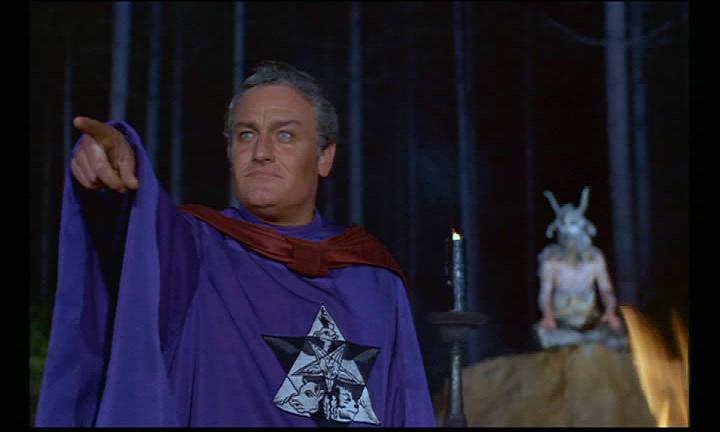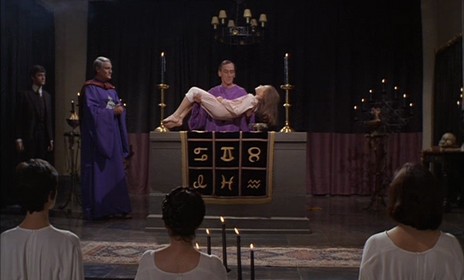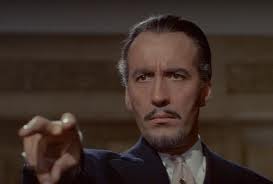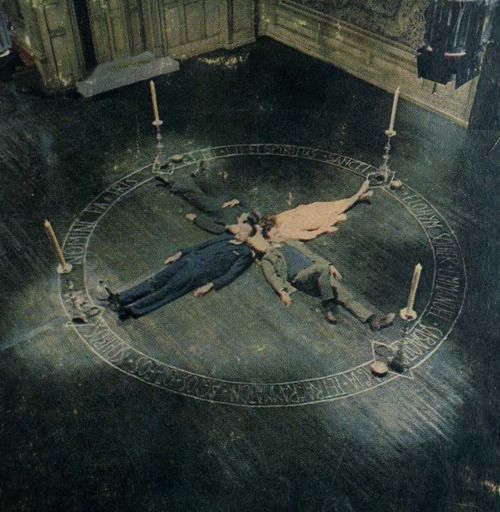Old School Satanists
Dennis Wheatley (1897-1977) was one of the world’s best selling authors from the 1930’s to the 1960’s. He wrote historicals, World War II adventure, espionage, and occult novels. THE DEVIL RIDES OUT was actually his second novel (1935). A direct sequel to his first book, THE FORBIDDEN TERRITORY (1933) a straight adventure which employed the main characters, though DEVIL is an out and out fantasy. Probably not the first novel to utilise Satanism as a core plot device, but certainly one of the most popular early ones.
The following review follows my usual novel review format. Since cover shots of the various editions proved to be almost entirely elusive, all of the images within the body of the review come from the Hammer film adaptation, starring Chris Lee as the main protagonist, the French Duc de Richleau.
Characters: The heroes are all of a common type for the novel’s time period: all, rich, cultivated men with upper class sensibilities. There’s the giant young American dumbass, the sophisticated, educated, older, French aristocrat, the rich British guy who happens to have his own four seater airplane sitting around when one would be handy, and the Jewish British financier guy, whom, to Wheately’s credit, is just one of the gang but doesn’t really appear to have any overt Jewish characteristics. I know that you don’t want him to be going around saying “Oy, gevelt!” continuously, but there should have been something in his manner, actions, or even looks to indicate that he was Jewish. Other than his first name (“Simon”) and his job as “financier.” None of the four protagonists show much depth. Their opponent, the head Satanist Mocata, is somewhat more interesting, but isn’t really on stage all that much. Sinister when he is, though. Mocota was apparently based on the Great Beast himself, Aleister Crowley, whom Wheatley apparently knew quite well. 56
Setting: Contemporary England (and bits of Europe), mid-1930s. It surprised me a bit how casual some things were. Ah, the villain has fled the country? Well, let’s hop into Richard’s four seater and chase him across Europe. Passports? We don’t need no stinking passports. Flight plan? We don’t need no stinking flight plan. Was it really that easy? In any case, settings are mostly atmospheric, and Wheately does know his upper-class hangouts. 84
Plot: For largely unspecified reasons, Simon (the Jewish guy) gets involved with Black Magic. Just dabbling, really, but it gets out of hand, and the boys have to rescue him. Wheatley throws the occult kitchen sink into this book. Now it may look cliched, but back then it was largely new stuff. He even covered (discretely) elements usually shunned by writers of that time period, like orgies (though none take place on-stage), and kissing the Devil’s ass at sabbaths (which does occur), and the mummified penis of the god Osiris (which gets handled a fair bit). Wheatley gets it mostly right (though he does insists that the druids’ built Stonehenge). The plot gets talky in places, and is frequently advanced through dumbassery, mostly by the feckless American Rex Van Ryn. You can count on one thing in this book. If de Richleau tells Van Ryn that it is imperative that he not do so-and-so, when the time comes he’ll do it. But the dumbassery is not solely limited to Van Ryn. The three decide to hie themselves to their friend Richard Eaton’s house after they rescue Simon and are fleeing from Mocata. The house he shares with his wife and toddler, an overwhelming over-sentimentalized daughter, and when the utterly evil black magician kidnaps the daughter, someone says, “Well, I never expected that to happen!” Really? I did, the moment she was introduced. Overall, a decent occult mystery, though it is also wrapped up by a deus ex machina, literally, as Richleau calls in an occult heavy-hitter to deal with Mocata. 69
Style: Not badly written, though Wheatley does have a tendency to repeat things, description, obvious character traits, and even plot points, a bit too much. 82
Overall rating, 73, which puts THE DEVIL RIDES OUT firmly into my recommend with reservations class. It compares quite favorably to similar writers of the time period, such as Sax Rohmer (Rohmer’s career started than Wheatley’s). Particularly recommended if you’re interested in the subject matter.





There are no comments